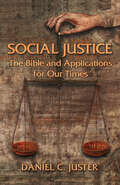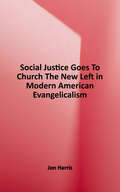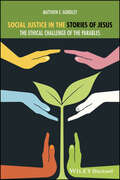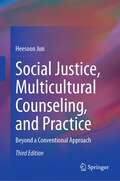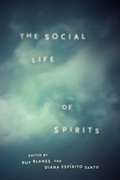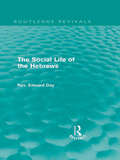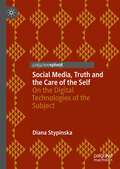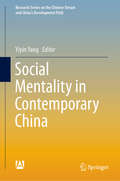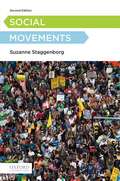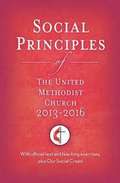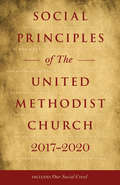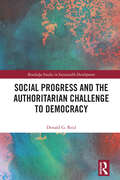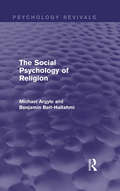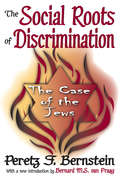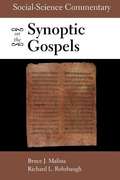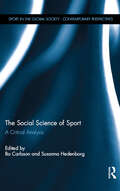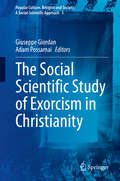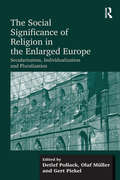- Table View
- List View
Social Justice: The Bible and Applications for Our Times
by Daniel Juster, Th.D.Justice, as a concept, mostly refers to all members of a society getting a just deal in provision and opportunity. As contrasted to legal justice before courts, where there is just restitution for crimes, resolution of conflicting claims for pay, inheritance and punishment for crimes, social justice is very connected to economic justice. Deuteronomy 17:10, affirms, Justice and only justice you are to pursue. (From the introduction)
Social Justice Goes To Church: The New Left In Modern American Evangelicalism
by Jon HarrisIn order to understand why so many evangelicals recently support left-leaning political causes, it is important to know a little history. In the 1970s, many campus radicals raised in Christian homes brought neo-Marxist ideas from college back to church with them. At first, figures like Jim Wallis, Ron Sider, and Richard Mouw made great gains for their progressive evangelical cause. But, after the defeat of Jimmy Carter, the religious right stole the headlines. Today, a new crop of mainstream evangelicals has taken up the cause of the New Left whether they know it or not. As pro-life evangelicals rush to support movements like #BlackLivesMatter and #MeToo, it is important to realize they are walking in footprints already laid down. Their mission may be more successful, but it is not new. To understand where the evangelical social justice movement is heading, it is vital to understand the origins of the movement. Social Justice Goes to Church: The New Left in Modern American Evangelicalism answers, from a historical perspective, the vital question, "Why are American evangelicals moving Left?"
Social Justice in the Stories of Jesus: The Ethical Challenge of the Parables (Lived Religions)
by Matthew E. GordleyInvites a new generation of readers to apply ethical reasoning to social justice challenges, accessible to people of faith from a broad range of backgrounds Social Justice in the Stories of Jesus introduces readers to the parables of the New Testament while exploring how they relate to social justice, ethics, and key issues of modern society. Centering on themes of mercy, justice, and human dignity, this unique volume invites readers to reflect on the meaning of Jesus's parables both in their original setting and in the context of present-day moral and ethical challenges. The author discusses social justice concepts from various traditions to enable readers to engage with the ethical implications of the parables in a range of different contexts. Each chapter focuses on one parable or set of parables, such as the parable of the Good Samaritan and the parable of the Pharisee and the Tax Collector, and includes historical background information and an analysis and interpretation of the parable. Throughout the text, the author highlights the connections between Jesus's parables and racism, violence, poverty, the environment, our obligations to one another, and other timely social justice issues. Blends an accessible overview of the parables of Jesus with an introduction to social justice and ethics Explores New Testament parables as viewed through the lens of contemporary writers, ethicists, and activists Emphasizes the Jewish roots of the parables and the need to guard against anti-Jewish readings of the parables Highlights the ways that Jesus’s parables challenged his first-century listeners to see their world in new ways and recognize the dignity of every person Engages with seminal thinkers in contemporary social justice, such as James Cone, Howard Thurman, Emilie Townes, Bishop Michael Curry, and Pope Francis Includes study and discussion questions for personal and group use Requiring no prior knowledge of the subject, Social Justice in the Stories of Jesus: The Ethical Challenge of the Parables is an ideal textbook for introductory courses on the Bible and New Testament, faith-based courses on ethics, and general Christian readers looking for an excellent resource for personal or congregational study.
Social Justice, Multicultural Counseling, and Practice: Beyond a Conventional Approach
by Heesoon JunThis third edition book offers a paradigm shift in thinking (from binary to complex) and enables visibility for the intersectionality of multiple identities that range from privileged to oppressed. For example, real people’s heterogeneous racial identities within the same racial group are visible. A paradigm shift in learning (from conceptual to transformative) connects conceptual learning (cognition) to their experience (affect). “…. transformation does not simply emerge due to the individual’s awareness…. but is experienced” (Benetka & Joerchel, 2016, p. 22). Uncensored first-person (subjective) written responses to specific questions to access unconscious and implicit bias will connect the writer’s experience to conceptual learning of diversity, equity, and inclusion. Writing in third person (objective) interrupts the transformative aspect by bypassing the accessibility of inner experience. Writing in first-person connects the writer to their experience which allows the unconscious to be accessed if it is practiced on a regular basis. This book is for everyone who wants to implement diversity, equity, and inclusion measures by learning to access their unconscious bias. Understanding social justice and equity and good intentions alone do not lead to accessing unconscious bias.
Social Justice through Citizenship?
by Aleksandra LewickiLewicki examines how current salient discourses of citizenship conceptualize democratic relations and frame the 'Muslim question' in Germany and Great Britain. Citizenship is understood not as a static or monolithic regime, but as being reproduced through competing discourses that can facilitate or inhibit the reduction of structural inequalities.
The Social Life of Hagiography in the Merovingian Kingdom
by Jamie KreinerThis book charts the influence of Christian ideas about social responsibility on the legal, fiscal and operational policies of the Merovingian government, which consistently depended upon the collaboration of kings and elites to succeed, and it shows how a set of stories transformed the political playing field in early medieval Gaul. Contemporary thinkers encouraged this development by writing political arguments in the form of hagiography, more to redefine the rules and resources of elite culture than to promote saints' cults. Jamie Kreiner explores how hagiographers were able to do this effectively, by layering their arguments with different rhetorical and cognitive strategies while keeping the surface narratives entertaining. The result was a subtle and captivating literature that gives us new ways of thinking about how ideas and institutions can change, and how the vibrancy of Merovingian culture inspired subsequent Carolingian developments.
The Social Life of Spirits
by Ruy Blanes Diana Espírito SantoSpirits can be haunters, informants, possessors, and transformers of the living, but more than anything anthropologists have understood them as representations of something else--symbols that articulate facets of human experience in much the same way works of art do. The Social Life of Spirits challenges this notion. By stripping symbolism from the way we think about the spirit world, the contributors of this book uncover a livelier, more diverse environment of entities--with their own histories, motivations, and social interactions--providing a new understanding of spirits not as symbols, but as agents. The contributors tour the spiritual globe--the globe of nonthings--in essays on topics ranging from the Holy Ghost in southern Africa to spirits of the "people of the streets" in Rio de Janeiro to dragons and magic in Britain. Avoiding a reliance on religion and belief systems to explain the significance of spirits, they reimagine spirits in a rich network of social trajectories, ultimately arguing for a new ontological ground upon which to examine the intangible world and its interactions with the tangible one.
The Social Life of Spirits
by Ruy Blanes Diana Espírito SantoSpirits can be haunters, informants, possessors, and transformers of the living, but more than anything anthropologists have understood them as representations of something else—symbols that articulate facets of human experience in much the same way works of art do. The Social Life of Spirits challenges this notion. By stripping symbolism from the way we think about the spirit world, the contributors of this book uncover a livelier, more diverse environment of entities—with their own histories, motivations, and social interactions—providing a new understanding of spirits not as symbols, but as agents. The contributors tour the spiritual globe—the globe of nonthings—in essays on topics ranging from the Holy Ghost in southern Africa to spirits of the “people of the streets” in Rio de Janeiro to dragons and magic in Britain. Avoiding a reliance on religion and belief systems to explain the significance of spirits, they reimagine spirits in a rich network of social trajectories, ultimately arguing for a new ontological ground upon which to examine the intangible world and its interactions with the tangible one.
The Social Life of the Hebrews (Routledge Revivals)
by Edward DayFirst published in 1901, this study of the social life of the Hebrews considers both the time of the judges and the time of the monarchy. Written in a popularly scientific style, designed to appeal to students of ancient Middle East and biblical history as well as the general reader, this work details the social life and history of allied Semitic races, covering the period of time from the settlement of Canaan to the breakup of the Northern Kingdom in 722 BC.
Social Media, Truth and the Care of the Self: On the Digital Technologies of the Subject
by Diana StypinskaThis book explores the relationship between (post)truth and subjectivity by focusing on social media as a site of digital subjectification. These days, truth is cheap. Anyone can claim it. Indeed, most do – impudently and without any recourse to facts or objective reality. Truth-claims today are nothing but power grabs, employed in the permanent popularity contest that our culture and politics have become. Correspondingly, our very sense of reality is perpetually uprooted. Post-truth sets us adrift. Navigating by smartphones, we pursue endless mirages, coming to wonder whether the shoreline itself is a myth. The book examines the ways in which different digital practices – such as influencing, trolling and digital activism – operate as technologies of the subject, shaping how we relate to ourselves, others and the world. It argues that social media facilitates the progressive eclipsing of our subjective (dis)positions by the economic imperative. Positioning post-truth as the outcome of unbridled economicization, it exposes the true costs of its supremacy. The critical reflections on the relationship between digital subjectification and the social offered by this book will be of relevance to academics and students working in the fields of sociology, media and cultural studies, politics, and philosophy.
Social Mentality in Contemporary China (Research Series on the Chinese Dream and China’s Development Path)
by Yiyin YangThis book not only seeks to theoretically analyze the concept, chief characteristics and framework of “social mentality”, but also explores the influence of social mentality on such elements of social functioning as individuals, groups, societies, markets and countries, and the influence of such elements as cultural, social, economic, political and mental factors on social mentality. Besides, this book discusses the structure of social mentality, tools for measuring it, and an indicator system. What’s more, it explores the role of the social mentality mechanism in the construction of harmonious societies.
Social Movements
by Suzanne StaggenborgSocial movements around the world have used a wide variety of protest tactics to bring about enormous social changes, influencing cultural arrangements, public opinion, and government policies in the process. This concise yet in-depth primer provides a broad overview of theoretical issues in the study of social movements, illustrating key concepts with a series of case studies. It offers engaging analyses of the protest cycle of the 1960s, the women's movement, the LGBT movement, the environmental movement, right-wing movements, and global social justice movements. Author Suzanne Staggenborg examines these social movements in terms of their strategies and tactics, the organizational challenges they faced, and the roles that the mass media and counter-movements played in determining their successes and failures.
Social Principles of the United Methodist Church
by The United Methodist ChurchDiscusses the official social principles of the United Methodist Church
Social Principles of The United Methodist Church 2013-2016
by The Reverend Doctor Clayton Childers The Reverend Neal ChristieThis 64-page booklet is a tool designed to help individuals and small groups study the Social Principles of The United Methodist Church. It contains the official text of the Social Principles from The Book of Discipline of The United Methodist Church 2012 along with exercises for individuals or small groups, a topical index, and Our Social Creed. The Social Principles of The United Methodist Church are the product of ninety-eight years of legislative decisions made by lay and clergy members of The United Methodist Church and its predecessor denominations. The Social Principles are prayerful and thoughtful efforts on the part of many General Conferences to speak to complex and controversial issues in the global community. Studying the Social Principles provides opportunities to examine your own theology and ethics and to practice discipleship.
Social Principles of The United Methodist Church 2017-2020
by United Methodist Publishing HouseThis 64-page booklet is a tool designed to help individuals and small groups study em>The Social Principles of The United Methodist Church. It contains the official text of The Social Principles from The Book of Discipline of The United Methodist Church 2016 along with exercises for individuals or small groups, a topical index, and Our Social Creed. The Social Principles of The United Methodist Church are the product of ninety-eight years of legislative decisions made by lay and clergy members of The United Methodist Church and its predecessor denominations. The Social Principles are prayerful and thoughtful efforts on the part of many General Conferences to speak to complex and controversial issues in the global community. Studying The Social Principles provides opportunities to examine your own theology and ethics and to practice discipleship.
Social Progress and the Authoritarian Challenge to Democracy (Routledge Studies in Sustainable Development)
by Donald G. ReidSocial Progress and the Authoritarian Challenge to Democracy examines the authoritarian challenge to present-day democracy through a framing of social progress theory and the idea of the social contract. Building on the author’s previous work, this book discusses whether social progress is linear and on a continual upward trajectory to human betterment, or if there are peaks and troughs along the way. More importantly, it questions that, if social progress exists, is it compatible with social and environmental sustainability? At the outset the book introduces the concepts of social contract theory and the idea of human social progress, long considered to be settled conditions, now ripe for further examination. Each chapter carefully analyses the contemporary struggle between democracy and authoritarianism, using examples from the USA as a foundation to discuss and compare democracies from around the world encountering the pressures of rising authoritarianism, including anti-immigration, xenophobia and anti-institutionalism. It argues that if the climate crisis is to be urgently addressed as required, the rise in authoritarian thinking, with its focus on maintaining power and the creation of individual wealth, presents a challenge to both our societal foundations and environmental sustainability. Highlighting and analysing topics of critical importance to today’s society, this book will have widespread appeal to academics, researchers and postgraduate students throughout the social sciences including sociology, political science, philosophy, environmental sustainability and development studies.
The Social Psychology of Religion (Psychology Revivals #Volume 11)
by Michael Argyle Benjamin Beit-HallahmiOriginally published in 1975, this book is a completely rewritten, revised version of Michael Argyle’s standard work, Religious Behaviour, first published in 1958. A great deal of new research had appeared since that date, which threw new light on the nature and origins of religious behaviour, beliefs and experience. Trends in religious activity in Britain and the United States since 1900, and the state of religion in these two countries at the time, are examined. Evidence is presented on the origins of religious activity – including the effects of stress, drugs, meditation, evangelistic meetings, personality variables, and social class. Other studies examine the effects of religion, for example on mental and physical health, political attitudes, racial prejudice, sexual behaviour, morals, and the relation between religion and scientific and other achievements. The findings are used to test the main theories about religion which have been put forward by psychologists and other social scientists, such as Freud’s father-projection theory, cognitive need theories, and deprivation-compensation theories.
The Social Roots of Discrimination: The Case of the Jews
by John W. ThibautThe Social Roots of Discrimination explains the phenomenon of anti-Semitism. In this classic volume, Peretz F. Bernstein looks for objective reasons why anti-Semitism flourished in European countries. Some civilized people would consider the notion of race uncivilized, but the existence of different races and the inequality of races with their specific race characteristics and on top of that the existence of superior and inferior human races was accepted as a fact of life and as a scientific truth long before the Nazis came to power. Although there is a marked difference in dealing with anti-Semitism in continental Europe in 1920 and the anti-Semitism in, for instance, the US in 2000, Berstein's ideas remain valuable.Starting from a concrete problem, anti-Semitism in Central Europe, Bernstein puts anti-Semitism in a general sociological theoretical framework. Far from limiting himself to fruitless elaborations on the common perceived unpleasant characteristics of Jews, he recognizes that the group is heterogeneous and that the usual arguments to justify anti-Semitism do not have any general validity, although they may hold for some specific individuals of the hated group, like individual members of any group may be less pleasant. Bernstein's ideas remain valuable.Bernstein tries to explain the hatred of Jews as the working of a more general mechanism--one that has nothing to do specifically with of Jews as a collective or as individuals. In doing so Bernstein attempts to sketch a general theory of social groups and conflicts between groups. The Social Roots of Discrimination gives an important message both for social scientists and for all intellectuals who are concerned with the strifes between nations, races, and social groups.
Social-Science Commentary on the Synoptic Gospels (2nd edition)
by Bruce J. Malina Richard L. RohrbaughThis book is an attempt to provide the reader with fresh insight into the social system shared by the authors of the Synoptic Gospels and their original, first-century Mediterranean audiences. Hence its purpose is to facilitate a reading that is consonant with the initial cultural contexts of those writings.
The Social Science of Sport: A Critical Analysis (Sport in the Global Society – Contemporary Perspectives)
by Bo Carlsson and Susanna HedenborgIn this book questions about definitions and demarcations of sport science are discussed. Not the least the many normative ideas of sport as good or as bad are problematized in relation to the academic field. These ideas permeate sport science in ways that are not seen in other academic fields like history, sociology or law. In addition, if and if so, in what ways sport science influence social science in general. Does sport science bring new questions in relation to issues like "what makes a society possible" or "what is a human being"?This book was published as a special issue of Sport in Society.
The Social Scientific Study of Exorcism in Christianity (Popular Culture, Religion and Society. A Social-Scientific Approach #3)
by Giuseppe Giordan Adam PossamaiThis book presents an academic analysis of exorcism in Christianity. It not only explores the crisis and drama of a single individual in a fight against demonic possession but also looks at the broader implications for the society in which the possessed lives. In recognition of this, coverage includes case studies from various geographical areas in Europe, North and South America, and Oceania. The contributors explore the growing significance of the rite of exorcism, both in its more structured format within traditional Christian religions as well as in the less controlled and structured forms in the rites of deliverance within Neopentecostal movements. They examine theories on the interaction between religion, magic, and science to present new and groundbreaking data on exorcism. The fight against demonic possession underlines the way in which changes within the religious field, such as the rediscovery of typical practices of popular religiosity, challenge the expectations of the theory of secularization. This book argues that if possession is a threat to the individual and to the equilibrium of the social order, the ritual of exorcism is able to re-establish a balance and an order through the power of the exorcist. This does not happen in a social vacuum but in a consumer culture where religious groups market themselves against other faiths. This book appeals to researchers in the field.
The Social Significance of Religion in the Enlarged Europe: Secularization, Individualization and Pluralization
by Olaf MüllerEngaging with some of the central issues in the sociology of religion, this volume investigates the role and significance of churches and religion in contemporary Western and Eastern Europe. Based on an extensive international research project, it offers case studies of various countries (including Finland, Ireland, Portugal, Germany, Poland, Russia, Estonia, Hungary and Croatia), as well as cross-country comparisons. Researching more precisely the present social relevance of church and religion at different levels, The Social Significance of Religion in the Enlarged Europe raises and responds to both descriptive and explanatory questions: Can we observe tendencies of religious decline in the various Western and Eastern European countries? Are we witnessing trends of religious individualization? To what extent has there been a religious upswing in the last few years? And what are the factors causing the observed processes of religious change? Marked by its broad range of data and a coherent conceptual framework, in accordance with which each chapter assesses the extent to which three important theoretical approaches in the sociology of religion - secularization theory, the market model of religion, and the individualization thesis - are applicable to the data, this book will be of interest to scholars of sociology, politics and religion exploring religious trends and attitudes in contemporary Europe.
Social Studies: States and Regions
by Harcourt Brace"Every one of you already holds the important office of citizen. Over time you will become more and more involved in your community. You will need to know more about what being a citizen means. Social studies will help you learn about citizenship. That is why social studies is important in your life."
Social Theory and Religion
by James A. BeckfordMany aspects of religion are puzzling these days. This 2003 book looks at ways of improving our understanding of religious change by strengthening the links between social theory and the social scientific study of religion. It clarifies the social processes involved in constructing religion and non-religion in public and private life. Taking illustrations of the importance of these boundaries from studies of secularisation, religious diversity, globalisation, religious movements and self-identity, Beckford reviews social scientific knowledge about religion and assesses the strengths and weaknesses of a wide range of theoretical attempts to account for religious change and continuity. The discussion goes in two directions. The first is towards identifying ways in which studies of religion would benefit from taking better account of themes in recent social theory. The second is towards identifying reasons for social theorists to pay more attention to the findings of empirical investigations of religion.
A Social View of Socotra Island: People, Culture, Heritage
by Nataša Slak Valek Ahmad Abdelmoniem ZedanThis book focuses on Socotra Island, geographically based in Yemen, and aims to explore the island from the social sciences point of view. This book focuses on people indigenous to Socotra, Socotri cultures, heritage and also offers contributions from business, tourism, linguistic, communication, and anthropology. While a lot has been published in natural science about Socotra’s endemic species, biodiversity, and nature in general, social scientific research of the island is very limited. This book addresses therefore addresses this gap and explores various topics of tourism, behaviours, cultures, and language.This book focuses on a clear social science approach of Socotra. The purpose of this book is to publish research about the people, behaviors, heritage, and potential tourism of Socotra. The Socotra Archipelago has long been a land of mystery. It is unknown as a tourism destination for many, however, is a popular destination for adventurers, photographers and travelers who like to travel to remote and undeveloped places. This book explains how Socotra has limited resources of electricity, which is provided by diesel generators, Internet is very slow and limited to certain points on the island. There are no shopping malls or five-star hotels. Roads, schools, and hospitals have been built only recently. This book shoes how these island people do not know the development as we do, which makes it principally interesting to research. Previous interviewers of Socotri people about tourism development in the island have faced many challenges such as language barriers, lack of understanding the meanings and interviewing content, lack of support for the anticipated research results. This book successfully undertakes this challenge as not only in understanding the language, but understanding phenomena like e.g. tourism. Whilst acknowledging the ways in which indigenous island people have never travelled or seen a developed city. Thus, words like ‘developed’, ‘tourism destination’ or ‘washing machine’ may be unfamiliar terms for them. Therefore, new and innovative research methods that are sensitive to Socotra people were implemented in the creation of this book.
